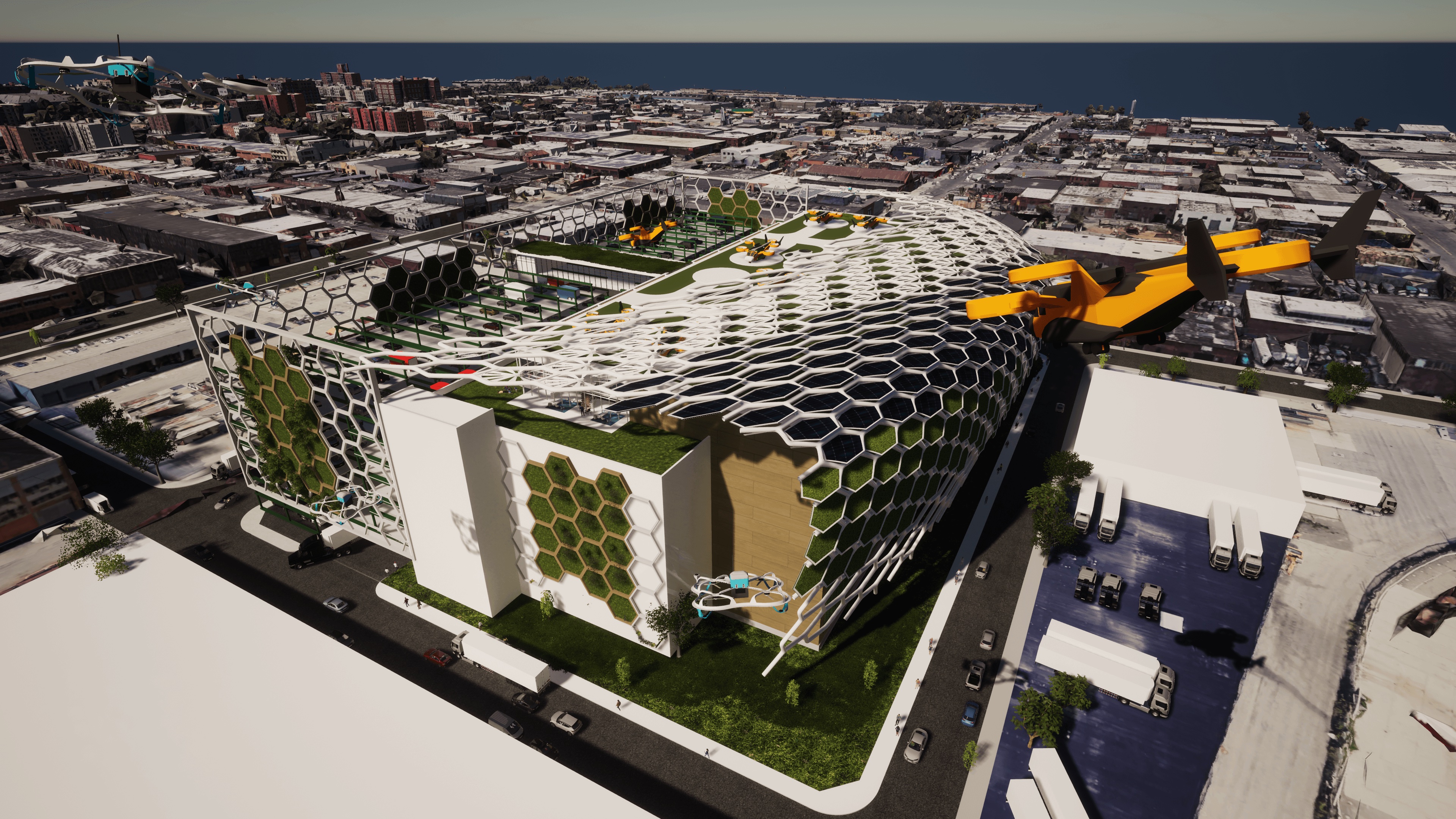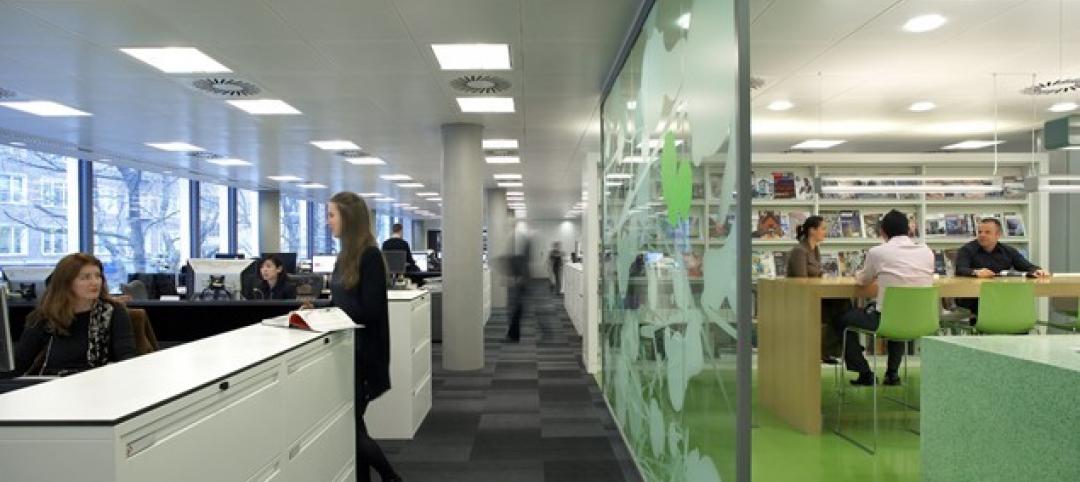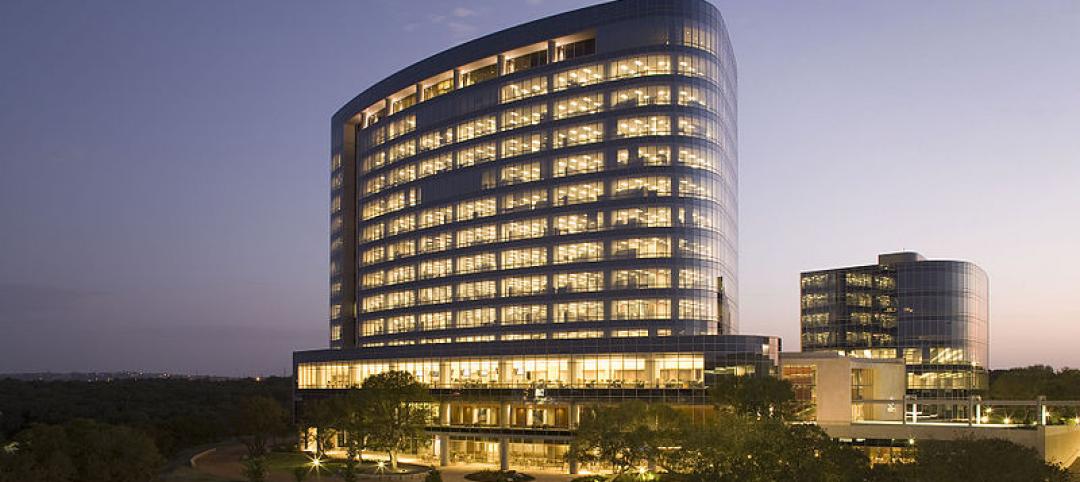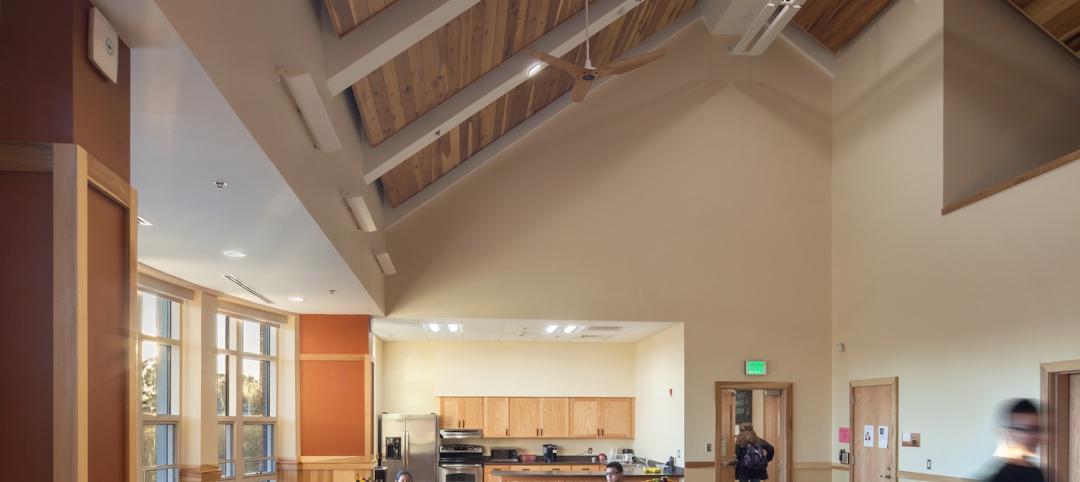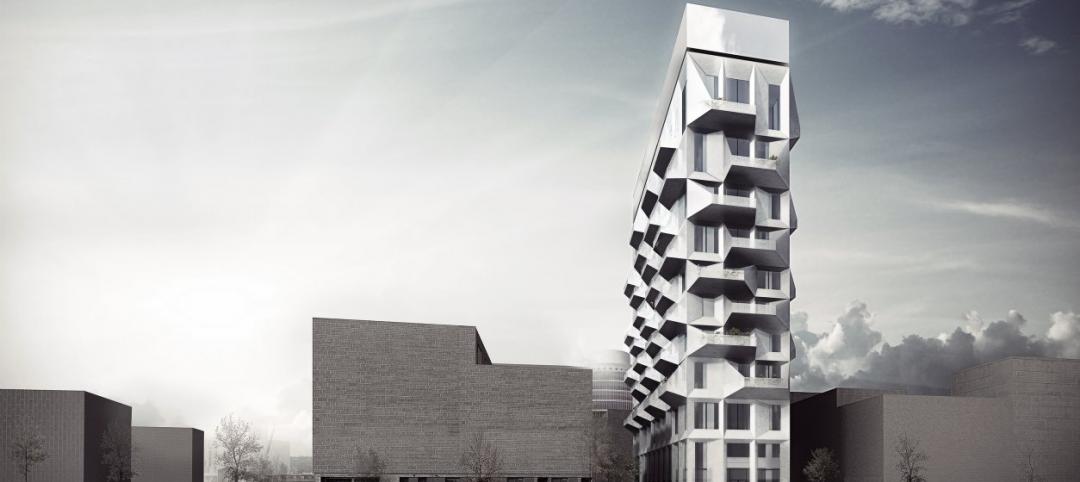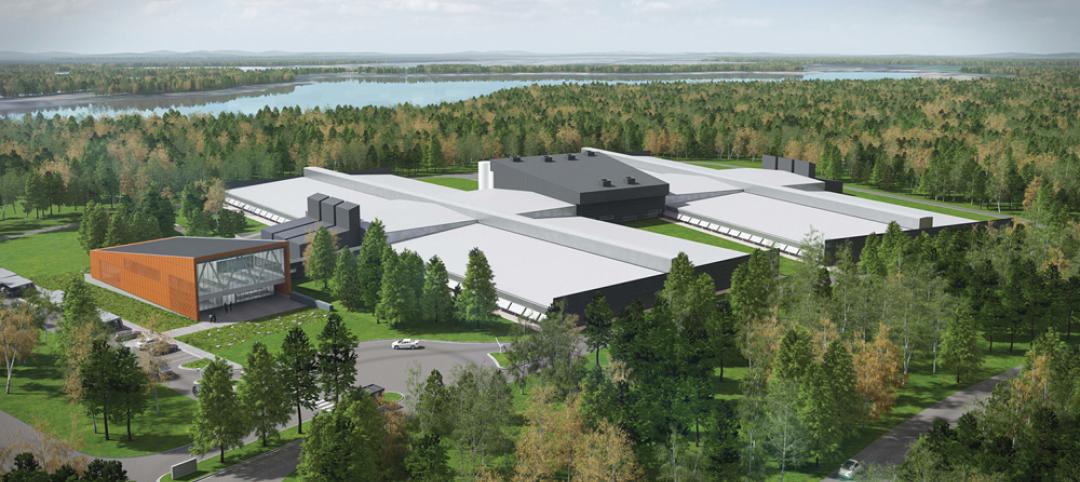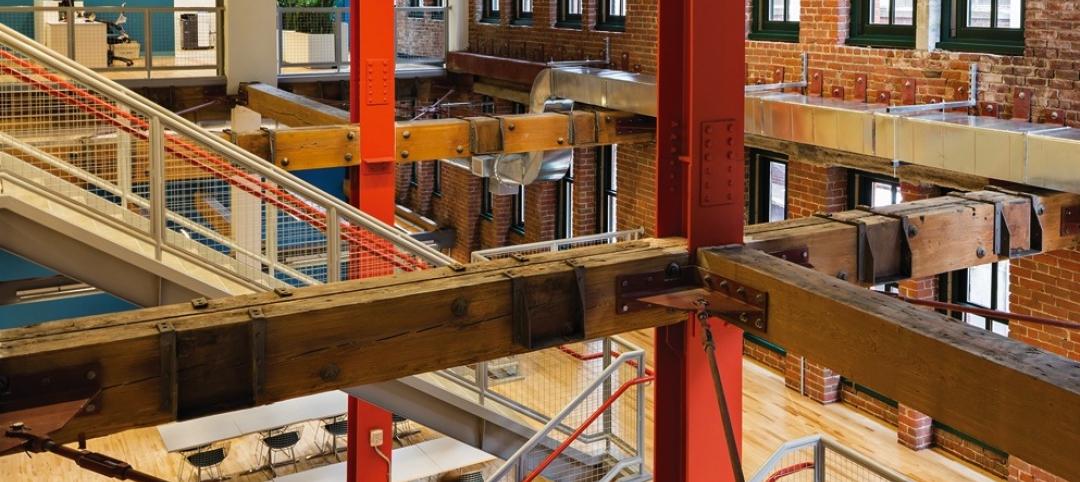Demand for multistory logistics centers is increasing in cities around the country that are looking to provide “last mile” ecommerce delivery to urban populations while using the least amount of costly land possible.
But vertical logistics centers have their own operational complexities that include inventory and fleet management, vehicular parking, and staying abreast of the latest transportation modes and technologies.
The national design firm Ware Malcomb recently presented a design concept for a Logistics Building of the Future at a conference in Jersey City, N.J., conducted by NAIOP, the Commercial Real Estate Development Association. This concept, which the firm is calling a “thought exercise,” places a premium on technology driven efficiency and coordination. The concept also pays heed to reducing the building’s carbon footprint through a combination of natural and mechanical solutions.
The question being answered by this design concept, says Matt Brady, LEED AP, an Architect and Executive Vice President at Ware Malcomb’s office in Irvine, Calif., is how to fit more products into a facility while realizing the greatest efficiency. “The through-put is the game changer,” he says.
Automation drives efficiency
This hypothetical logistics center is a five-story building (including its roofdeck) that would sit on 4.6. acres in San Francisco. Ware Malcomb collaborated with several industry leaders to devise this concept, including Jones Lang LaSalle, DH Property Holdings (a leading developer of urban infill industrial facilities), Suffolk Construction (for building costs), and Parkmatic, which provides space-controlling automated parking racks.
Brady says computer-driven systems play a big role in the logistics center’s operations: they coordinate arrivals so that trailers can be precision-parked into the facility’s docks; they organize and stage the storage of goods in the building’s tall warehouse so inventory can be retrieved quicker; and in partly automated packing areas, loads of goods are created to be placed into smaller delivery vans, the drivers for which are assigned automatically.
One of the big problems for vertical logistics center in urban settings is finding enough space for parking. Brady notes that in New York, trailer and van drivers sometimes end up parking blocks from existing facilities. Ware Malcomb’s design concept stacks employee vehicles in racks so delivery vans can fit into the center and aren’t idling elsewhere. Brady acknowledges that parking becomes more of a challenge when vehicles are electric and take time to recharge.
Ware Malcomb’s concept is multimodal and assumes electric vehicles and delivery drones. “Flying vehicles aren’t here yet, but warehouses need to be ready for them,” he explains.
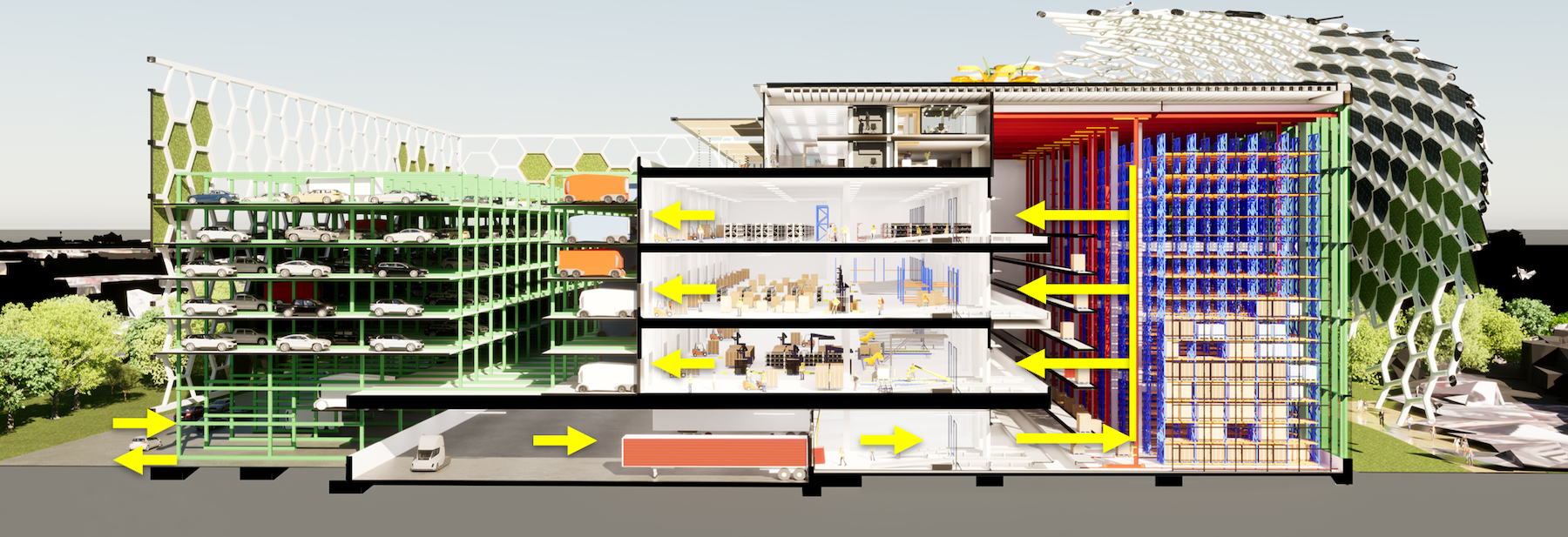
A greener distribution center
The design concept also shows options to reduce the logistics center’s carbon footprint. For example, the concept envisions a honeycombed skin that generates wind and cools the building’s exterior surface. The concept also incorporates sustainable features such as agricultural air filtration, wind turbines, angled solar cells, photoreactor algae-filled glass, rainwater collection, and 3D-printed flexible infrastructure.
Brady says the feedback from developers so far has been positive, and at least one developer is interested “in doing something like this.” An ecommerce company has expressed interest in using Ware Malcomb’s design concept as part of a charrette about industrial buildings in general.
Ware Malcomb sees its concept as leading to speculative development, ideally for a single tenant per building so that there’s just one systems operator. Brady says that the point of this exercise is not to get developers to copy the concept as much as it is to prepare them for what might be coming. “Occupiers are evolving fast, and developers need to keep up,” he says.
Brady also believes that while new construction of industrial buildings has been leveling off, demand is a function of the economy. “Based on people we talk to, there’s still a lot of room for ecommerce growth.”
Related Stories
| Sep 17, 2014
New developments in data center design
From the dozen or so facilities housing Google’s 900,000 servers to the sprawling server farms of Facebook to Amazon’s seven sites scattered around the world, today’s data centers must accommodate massive power demand, high heat loads, strict maintenance protocols, and super-tight security. This AIA Discovery course is worth 1.0 AIA CES HSW learning units.
| Sep 9, 2014
Using Facebook to transform workplace design
As part of our ongoing studies of how building design influences human behavior in today’s social media-driven world, HOK’s workplace strategists had an idea: Leverage the power of social media to collect data about how people feel about their workplaces and the type of spaces they need to succeed.
| Sep 7, 2014
Ranked: Top state government sector AEC firms [2014 Giants 300 Report]
PCL Construction, Stantec, and AECOM head BD+C's rankings of the nation's largest state government design and construction firms, as reported in the 2014 Giants 300 Report.
| Sep 3, 2014
New designation launched to streamline LEED review process
The LEED Proven Provider designation is designed to minimize the need for additional work during the project review process.
| Sep 2, 2014
Ranked: Top green building sector AEC firms [2014 Giants 300 Report]
AECOM, Gensler, and Turner top BD+C's rankings of the nation's largest green design and construction firms.
| Sep 2, 2014
Extreme conversion: 17-story industrial silo to be converted to high-rise housing
As part of Copenhagen's effort to turn an industrial seaport into a bustling neighborhood, Danish architecture firm COBE was invited to convert a grain silo into a residential tower.
| Aug 26, 2014
Ranked: Top industrial sector AEC firms [2014 Giants 300 Report]
Stantec, Jacobs, and Turner top BD+C's rankings of the nation's largest industrial sector design and construction firms, as reported in the 2014 Giants 300 Report.
| Aug 6, 2014
25 projects win awards for design-build excellence
The 2014 Design-Build Project/Team Awards showcase design-build best practices and celebrate the achievements of owners and design-build teams in nine categories across the spectrum of horizontal and vertical construction.
| Aug 4, 2014
Facebook’s prefab data center concept aims to slash construction time in half
Less than a year after opening its ultra-green, hydropowered data center facility in Luleå, Sweden, Facebook is back at it in Mother Svea with yet another novel approach to data center design.
| Jul 28, 2014
Reconstruction market benefits from improving economy, new technology [2014 Giants 300 Report]
Following years of fairly lackluster demand for commercial property remodeling, reconstruction revenue is improving, according to the 2014 Giants 300 report.


